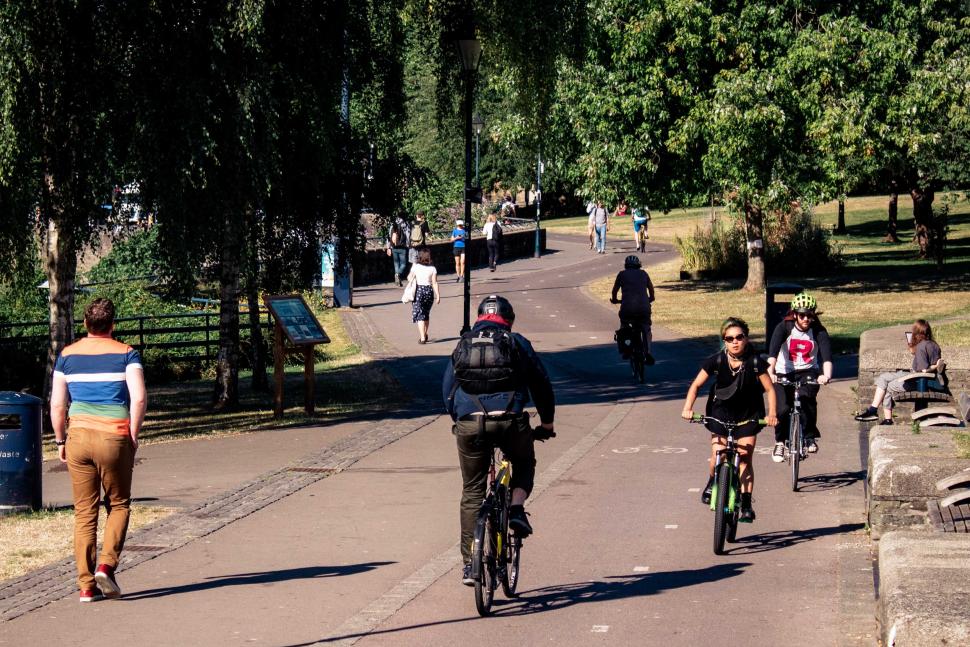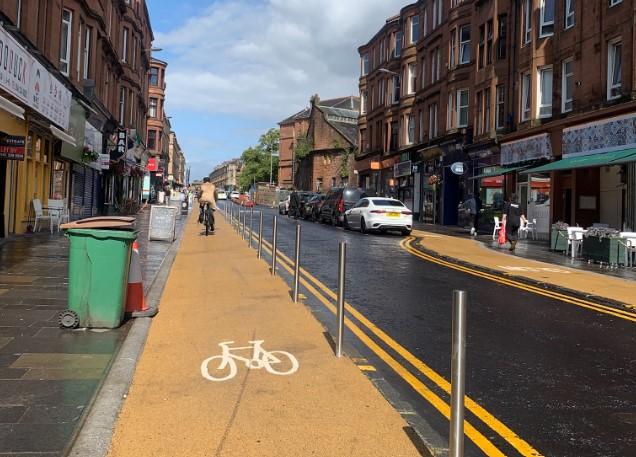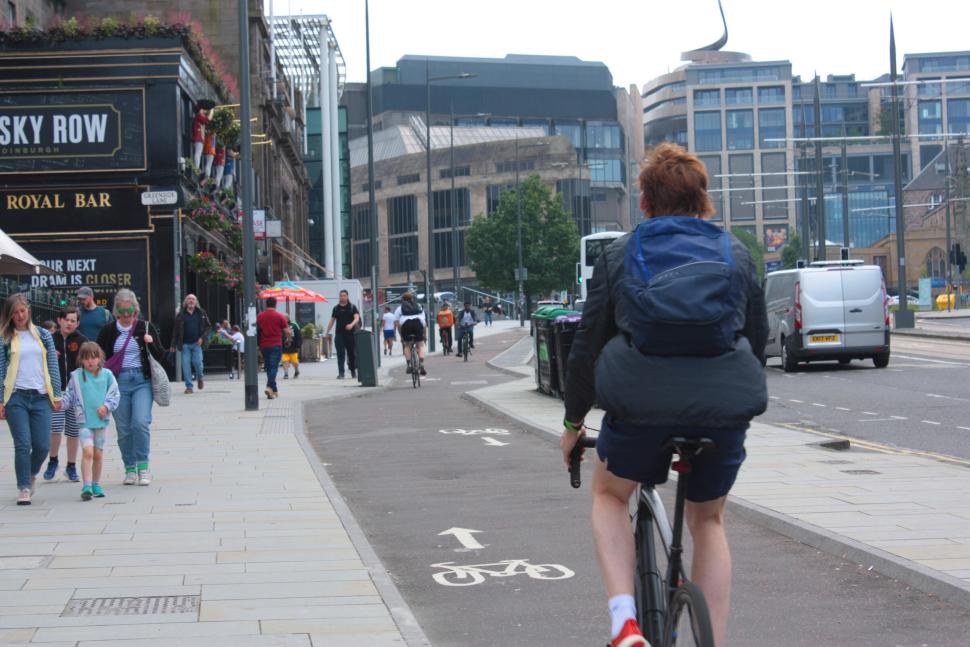- News
- Reviews
- Bikes
- Accessories
- Accessories - misc
- Computer mounts
- Bags
- Bar ends
- Bike bags & cases
- Bottle cages
- Bottles
- Cameras
- Car racks
- Child seats
- Computers
- Glasses
- GPS units
- Helmets
- Lights - front
- Lights - rear
- Lights - sets
- Locks
- Mirrors
- Mudguards
- Racks
- Pumps & CO2 inflators
- Puncture kits
- Reflectives
- Smart watches
- Stands and racks
- Trailers
- Clothing
- Components
- Bar tape & grips
- Bottom brackets
- Brake & gear cables
- Brake & STI levers
- Brake pads & spares
- Brakes
- Cassettes & freewheels
- Chains
- Chainsets & chainrings
- Derailleurs - front
- Derailleurs - rear
- Forks
- Gear levers & shifters
- Groupsets
- Handlebars & extensions
- Headsets
- Hubs
- Inner tubes
- Pedals
- Quick releases & skewers
- Saddles
- Seatposts
- Stems
- Wheels
- Tyres
- Health, fitness and nutrition
- Tools and workshop
- Miscellaneous
- Buyers Guides
- Features
- Forum
- Recommends
- Podcast
 Cyclists and pedestrians in Castle Park, Bristol (image: Adwitiya Pal)
Cyclists and pedestrians in Castle Park, Bristol (image: Adwitiya Pal)Labour government to invest "unprecedented levels of funding" in cycling
In an encouraging interview for those concerned by Labour's lack of emphasis on plans for active travel during the election campaign and in the aftermath of their landslide victory, new Transport Secretary Louise Haigh has pledged the government will invest "unprecedented levels of funding" in cycling and walking, as well as developing a new road safety strategy.
Speaking to Laura Laker for a piece in the Guardian, Haigh explained how active travel would form an important part of the government's approach to improving health and the environment, adding that "walking and cycling and moving more are essential to solving both of these in the immediate term and in the long term".
"There's lots of evidence to show that will reduce the number of GP appointments by hundreds of thousands, if not millions," Haigh said. "We absolutely want to make sure that we invest at unprecedented levels.
Last week, the head of the Department for Transport joined road.cc contributor and active travel author/journalist Laura Laker on a Trans-Pennine Trail (N62) cycle, along with Active Travel Commissioner Chris Boardman.
At the heart of Haigh's active travel plans, which were notably quiet during Labour's election campaign and first days in office, is that it is "utterly essential to develop our national integrated transport strategy". She also expressed a desire to move to a model of long-term funding settlements like what roads and rail enjoy, rather than the current system which has "pitted councils against each other" in a bidding system.
"We just want to make sure that the funding is delivered where it's needed… rather than where they've got the best bid writers, and where they've been good at hoovering up resources," Haigh explained, hoping that a move to a long-term funding model could make planning and delivery of higher quality, and joined up, active travel projects easier.
"Cycle lanes and active travel work isn't properly joined up," she suggested. "It [transport and active travel] has knock-on effects everywhere else: it gets people healthier, it reduces the burden on the NHS because people are living healthier lives for longer.
"I am here to make sure that education can deliver those educational opportunities and make sure that people from all backgrounds can achieve no matter what postcode they're brought up in. [Transport is] … essential for delivering growth and obviously net zero and safer streets, safety on public transport networks, safety for women cycling down dark alleyways: they can't do any of it without transport."
An internal review into transport infrastructure projects is underway, with campaigners hoping the relative strong bang for buck that active travel can deliver versus roads projects will be noticed. In May, we reported that the last government knew it was not investing enough in cycling to hit active travel targets, a DfT document also showing that the department was aware that "Benefit cost ratio (BCRs) for the cycling central scenarios are in the range 2.0 to 3.1, implying high value for money".
In her piece, Laura explains how she asked the new Transport Secretary about the £16bn of trunk road projects that have been called "low value" by campaigners, Haigh responding: "We're looking at all capital projects, and where that money should be best spent. In a world where there's not much money, we want to make sure it's spent… [to] get the best bang for our buck."
And the MP for Sheffield Heeley appears keen to ensure access to high quality cycling infrastructure is not just something available to those living in major cities and urban areas.
"Rural poverty is a real blight, and it's not something that's really properly considered," she said. "Car ownership now is just so expensive, insurance as a young driver is completely out of reach for a lot of people. So having that access to safe cycle routes is a basic element, is a basic tenet of social justice."
On the issue of her own transport choices, Haigh said she "definitely" wants to cycle more, but has not yet in London.
"I've not cycled in London. I don't know why, because it's obviously super flat. I definitely do want to get into it more, not least because I don't have time to get to the gym. So it's a really good alternative… I'm afraid now I have my ministerial car, I don't know whether Dennis [her driver] would let me, he might have to drive alongside me or something ridiculous," she said.
Last month, Cycling UK called on the newly elected Labour government to put "divisive rhetoric" around active travel to bed "once and for all" with "coherent and committed" investment for cycling.
The cycling charity asked for 10 per cent of the total transport budget to be allocated to cycling and walking, while also moving away from the culture warring and "divisive rhetoric" around the topic stirred by the previous government.
And responding to Haigh's investment pledge, Cycling UK's director of external affairs Sarah McMonagle said: "We are thrilled that the Transport Secretary has made a firm commitment to 'unprecedented levels of funding'. By embracing a shift towards active travel, the government has begun to lay the foundations for a future where everyone has access to clean air, safer streets, and a more sustainable way of getting around.
"For decades, Cycling UK has stressed the potential for cycling to not only improve public health, but address the climate crisis head-on, boost the economy, and help to ease the cost-of-living crisis for everyone. Research by the IPPR, supported by Cycling UK, revealed that at least 10 percent of the total transport budget should be dedicated to active travel within five years to ensure that these benefits are realised.
"We know from working with communities that public support is strong, and we have a clear roadmap to create happier, healthier, greener lives through cycling. We hope to see the government translate these positive words into firm spending commitments for active travel in the forthcoming Autumn Budget."
Recently, Haigh was labelled as a "new convert" for cycling, as a few months after she made controversial comments about cycling, which she later described as a "light-hearted joke", she finally got round to travelling through her Sheffield constituency by e-bike, which she says has the potential to "make all the difference" in encouraging even those wary of the city's hills to cycle more.
In remarks to Department for Transport staff when she first took over the job, Haigh called efforts to make transport more environmentally friendly "the critical thread weaving through every priority".
"A huge amount has been achieved through your work on the switch to zero emission vehicles and sustainable aviation fuels, and we are looking forward to building on that," she told them. "But we will also get straight to work on our plans to make public transport and active travel much more attractive choices."
Dan is the road.cc news editor and joined in 2020 having previously written about nearly every other sport under the sun for the Express, and the weird and wonderful world of non-league football for The Non-League Paper. Dan has been at road.cc for four years and mainly writes news and tech articles as well as the occasional feature. He has hopefully kept you entertained on the live blog too.
Never fast enough to take things on the bike too seriously, when he's not working you'll find him exploring the south of England by two wheels at a leisurely weekend pace, or enjoying his favourite Scottish roads when visiting family. Sometimes he'll even load up the bags and ride up the whole way, he's a bit strange like that.
Latest Comments
- lesterama 6 min 12 sec ago
They also need to understand the difference between looking and seeing: Motorist: "D E F P O T E C" Also, motorist: "Empty road"
- Rendel Harris 15 min 12 sec ago
How do you know every other rider was able to cope with it, perhaps there were numerous wobbles and near misses from other riders (there certainly...
- George Platts 28 min 4 sec ago
47 years ago, as a founder of Cyclebag (7.7.77) and Sustrans I am disappointed by all of this. Our original hopes were to "make Bristol safer for...
- zweiblumen 1 hour 28 min ago
The decisive point here is that cyclists already use this route and no enforcement action is taken. I don't see how the residents will be...
- David9694 1 hour 36 min ago
Day 2: "get out of my way" " pay Road tax" "where's your hi viz" "the sun was in my eyes"
- bensynnock 1 hour 50 min ago
'slow traffic flow'....
- check12 9 hours 51 min ago
Surely please get down on your knees, rappers rap about gats not cats and foil isn't made from oil and can hold your all told
- David9694 11 hours 25 min ago
Elderly man sentenced following serious crash in Ringwood...
- the little onion 15 hours 28 min ago
I didn't remove the sound because I didn't think that it mattered - quite clearly the swearing was in reaction to an act of frankly horrid...


Add new comment
52 comments
I would argue there'd be less criticism of new infra if a more substantial section of the population had already sunk money on getting a nice new ebike.
But I bet they'd still be shouting if that meant they lost "their" parking space outside their house/their shop.
I don't cycle anymore it's just too dangerous. If only 1% of passes are close that, having been easily passed by 501 vehicles, is 5 brushes with death I can avoid. I'd settle for just being able to walk on a path without having to venture into the road, or breathin, just to pass the cars parked on the path.
The cynic in me thinks that Labour only have 4 years so there is only so much they will be able to do that isn't undone or abandoned soon. The DM has been running non-stop articles about Labour stealing your pensions, retirement and everything else. Obviously right next to these articles are others that explain how you can try and scam the government out of money for things as well...
You're probably right. Starmer is already on track to be the most disliked PM and has only been in office 6 weeks. Based on the hair brained policies he's fronting I can't seen him lasting 18 months.
In no way is Statmer on track to be the most disliked PM. Also (in response to mctrials23) unless they make a Sunak style stupid decision on election timing, Laboutr have at least five years. They only call an election after four if they are confident of winning.
His net approval rating is exactly zero, i.e. the same number of people approve of him as disapprove. That's after possibly the most difficult entry into a premiership since Winston Churchill in wartime, with the country racked by far-right rioting formented by those who thought they were going to hold the balance of power. At the same stage in his premiership, Rishi Sunak was -10 in approval ratings, after six weeks Liz Truss was -70. Most disliked, eh?
Hi Elon!
I thought it was Nigel.
Hi Elon!
Yes, this is rather pathetic Trump-Speak isn't it- rather like Trump claiming, to the acclaiming hordes of dim-witted rednecks , that Harris is stupid and ugly.
Are at least some of the hare-brained policies a consequence of trying to fix the overall sh!tshow that's been left for Labour by their predecessors…?
The plan should also include secure bike racks at GPs and Hospitals - most NHS facilities have space for hundreds of cars but few if any bikes.
bUT yOu CAn'T CyCLe tO tHe DoCTOr If yOu R ill.
(I'm sure that was what we were told when a GP surgery took out one parking space to put in cycle racks.)
I tend to cycle to the doctors', and indeed others do around the world [1] [2] [3] ...). Although not when I had a bike crash - to save time I called ... a taxi. I know well you can wait hours for an ambulance in Edinburgh at least!
Aside from us often choosing to a) centralise medical care for efficiencies of scale which leads to b) siting e.g. hospitals suitably for motor vehicle access e.g. near major roads / on the edge of population centres ... there are potentially lots of people visiting patients who might be persuaded to cycle!
So do I.
But driving is fine of course....
My GP surgery - in the middle of a village, walking distance from everywhere - has about ten car parking spaces and a row of four sheffield stands. Except that one of the stands is unusable because its been bent over where someone drove into it…
In my very limited observation they tend to have reasonable (secure) bike spaces for their staff, but where there are public racks they're not very good, or not particularly convenient. On the latter - I know "it's a hospital" so having to provide both facilities for many people AND managing flows of vehicles, people on foot etc. But if we're "encouraging cycling" it does need to be relatively attractive compared to driving and a lot of cycles can fit into one vehicle space.
There are many documented cases of NHS staff having their bikes nicked regularly from their "secure" storage areas.
The cynic in me thinks that bike storage space for the public isn't offered or prioritised because it'd be harder to monetise / justify exorbitant fees for such on site "parking" (though that in itself might incentivise some that are able, to cycle instead - IF there was any infra allowing this).
Good point on the infra. The most obvious route to Edinburgh Royal Infirmary for me is down a couple of not-very-nice busy roads with hill to slow you down. Some "covid-era" part-protected cycle lanes were added (pretty rubbish - usual deal of narrow / bus stops et.c but I'd hoped these were a statement of intent). However it seems that after being there for years rather than upgrading these to proper cycle paths the council is starting to just remove the protection...
There are alternatives (including some "on the paths") but they all add distance (say 1/7 the journey) and extra / higher climbs.
When I went for covid jabs by bike I was always asked if I was driving home (on the assumption that a 70+ wasn't going to cycle home in Birmingham?).
on the assumption that a 70+ wasn't going to cycle home in Birmingham?
When I signed on for a Moderna Covid vaccine trial, the problem wasn't the risk of the vaccine (pretty much nil- it was only a modified spike protein) it was cycling on Lancashire's Burma Railway- the A586 to Blackpool. This is so dangerous, that I declined the following year's vaccine trial. My experience of the Blood Transfusion Service is that you can't tell them you're cycling or they throw up their hands in horror- especially if it's a long way- lying is essential, or they'll cancel you
Pages